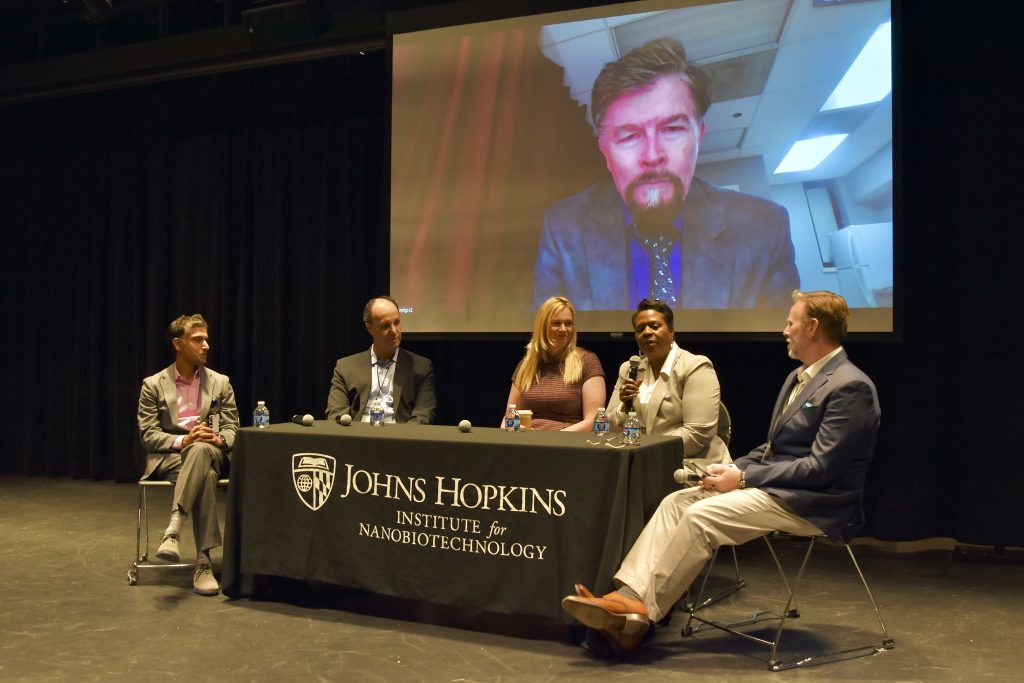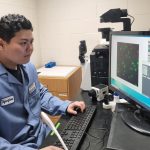RNA Innovations: Highlights of the 17th Nano-Bio Symposium

Innovations in RNA biology and therapeutics show immense potential in transforming the landscape of medical research and biotechnology development. RNA, particularly messenger RNA (mRNA), has emerged as a groundbreaking tool and is revolutionizing the way researchers and clinicians approach medicine. On Monday, May 13, the Institute for NanoBioTechnology hosted its 17th Nano-Bio Symposium, which explored the unprecedented possibilities of RNA innovations and its novel therapeutic avenues. We welcomed experts, researchers, and enthusiasts to share knowledge, exchange ideas, and delve into the latest advancements so that our collective efforts advance the full potential of RNA-based technologies and shape the future of healthcare and biomedicine.
“Today, we will hear from academic and industry thought leaders pushing the boundaries of RNA biology and engineering, as well as learn about methods to tune RNA metabolism, approaches to create synthetic gene regulatory networks, and chemical modifications that optimize RNAs as medicines,“ said T.E. Schlesinger, Benjamin T. Rome Dean at Johns Hopkins University’s Whiting School of Engineering. “And we will discover how these advances are brought to patients by leaders in RNA manufacturing.”
During the morning lectures, eight guest speakers from across the Johns Hopkins University, Johns Hopkins School of Medicine, National Institutes of Health, Maravai Life Sciences, Houston Methodist Hospital, Arcturus Therapeutics, and Tevard Biosciences spoke to attendees about the importance of RNA in biology and medicine. Keynote speaker Jeff Coller, Bloomberg Distinguished Professor of RNA Biology and Therapeutics at Johns Hopkins University, as well as the other speakers in academia and industry, spoke about the critical role nanotechnology plays in bringing RNA advancements to patients.
The launch of the RNA Innovation Center, which will be housed in INBT, was also announced during the day. With the support of Maravai, the best industrial practices to the development of preclinical RNAs for researchers will be brought to the Johns Hopkins community.
“The center will lower the activation energy for scientists to test RNA-based approaches in basic biology and in therapeutics, catalyzing a wave of discovery across our schools,” Schlesinger said.
The Institute hosted a networking reception and poster competition in the afternoon, which featured research by undergraduate students, graduate students, and postdoctoral fellows across the INBT and Johns Hopkins. With the help of volunteer judges, over 60 people competed for five cash prizes, which were sponsored by the INBT and Tom and Lois Fekete. Tom Fekete is the former INBT director of corporate partnerships and retired in 2018 after ten years at the INBT. The Fekete’s have been generously sponsoring the undergraduate awards since 2019.
“I am hopeful that this day is going to translate to a lot of research activity on campus and student training opportunities to understand the sophistication, promise, and potential of unlocking mRNA medicines,” said Hai-Quan Mao, director of the INBT and a professor of materials science and engineering.
Speakers
Jeff Coller, PhD
Harnessing RNA Metabolism for Precision Therapy
Bloomberg Distinguished Professor of RNA Biology and Therapeutics
Johns Hopkins School of Medicine
Biography
Gregory Newby, PhD
Therapeutic Genome Editing
Assistant Professor of Genetic Medicine, Johns Hopkins School of Medicine
Biography
Sarah Woodson, PhD
RNA Self-Assembly During Transcription
T.C. Jenkins Professor of Biophysics, Johns Hopkins University
Biography
Shalini Oberdoerffer, PhD
Multifaceted Regulation of Translation Through the mRNA Modification ac4C
Senior Investigator, National Institutes of Health
Biography
Kate Broderick, PhD
Chief Innovation Officer, Maravai Life Sciences
Biography
John P. Cooke, MD, PhD
Medical Director, Center for RNA Therapeutics, Houston Methodist
Biography
Roberta Duncan, MBA
Chief Strategy Officer, Arcturus Therapeutics
Biography
Daniel Fischer, MBA
President and CEO, Tevard Biosciences
Biography
Poster Competition Winners
Best Undergraduate Posters
Wilson Huang
PD-1 Therapeutic Antibody Expression Utilizing Self-Amplifying mRNA and Intramuscular Injection
Michael Prieto
Lys-UUU Anticodon Thiolation Contributes to Ribosome Stalling
Best Postdoctoral Fellow Poster
Yick Hin Ling
Disordered C-terminal Domain Drives Spatiotemporal Confinement of RNAPII to Enhance Search for Chromatin Targets
Best Graduate Posters
Myriel Kim
High Affinity Binding Enabled Biomaterial Design for Protein Purification
Tushar Nichakawade
TRBC1-Targeting Antibody Drug Conjugates for the Treatment of T-cell Cancers
People’s Choice Poster
Samantha Sarlin
Controlling Cell Behavior with Engineered Magnetosensitive Proteins





